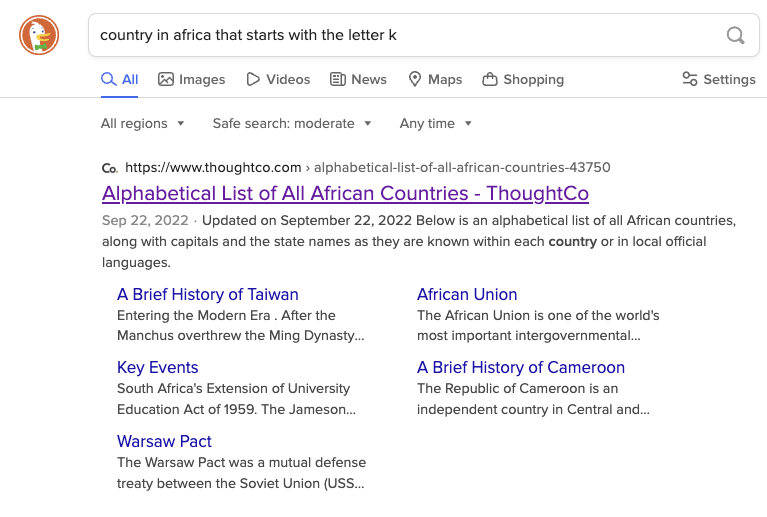DOIs are forever. It’s why they exist.
- 8 Posts
- 318 Comments

 191·6 months ago
191·6 months agoI don’t know which jurisdiction you’re in but, while it isn’t illegal in the UK, you’re absolutely right about it being a bad idea and you are correct about the reason. In the event of a crash, it could count against you (in the UK, at least).
I think you overestimate the amount of ‘thought’ going on here. (ref}
The way he plays with the meaning of words
She (or, if you’re not sure, they).
any kind of bureaucratic or rule-based decision-making
Human-written rules are often flawed, and for similar reasons (the sole human thought process that ‘AI’ is very good at reproducing is system justification). But human-written rules can be written down and they can be interrogated. But Apple landed itself in court because it had no clue how its credit algorithm worked and could not conceive how it could possibly be sexist if the machine didn’t get any gender data to analyse.
Perhaps that is the point.
That is, indeed, the point.
It’s asking why don’t we use it for that purpose, not suggesting that there is anything easy about doing so. I don’t know how you think science works, but it’s not like that.
The data cannot be understood. These models are too large for that.
Apple says it doesn’t understand why its credit card gives lower credit limits to women that men even if they have the same (or better) credit scores, because they don’t use sex as a datapoint. But it’s freaking obvious why, if you have a basic grasp of the social sciences and humanities. Women were not given the legal right to their own bank accounts until the 1970s. After that, banks could be forced to grant them bank accounts but not to extend the same amount of credit. Women earn and spend in ways that are different, on average, to men. So the algorithm does not need to be told that the applicant is a woman, it just identifies them as the sort of person who earns and spends like the class of people with historically lower credit limits.
Apple’s ‘sexist’ credit card investigated by US regulator
Garbage in, garbage out. Society has been garbage for marginalised groups since forever and there’s no way to take that out of the data. Especially not big data. You can try but you just end up playing whackamole with new sources of bias, many of which cannot be measured well, if at all.
It’s how LLMs work.
The systems didn’t do anything they weren’t told to do.
You’re thinking of the kinds of algorithms written by human beings. AI is a black box. No one knows how these models obtain their answers.
Where did you get insurance carriers from?
No idea what your post, before or after edit, is trying to say. But the subject of your quoted sentence is “proponents of AI” not “AI”, and the sentence is about what is enabled by AI systems. Your attempt at pedantry makes no sense.
If you’re suggesting that it is possible to build an AI with none of the biases embedded in the world it learns from, you might want to read that article again because the (obvious) rebuttal is right there.
Isn’t that a continuation of “why the outlier was culled”?
Not sure I follow, but I think the answer is “no”.
If you control for all the causes of a difference, the difference will disappear. Which is fine if you’re looking for causal factors which are not already known to be causal factors, but no good at all if you’re trying to establish whether or not a difference exists.
It’s really quite difficult to ask a coherent question with real-world data from the messy, complicated reality of human beings.
A simple example:
Women are more likely to die from complications after a coronary artery bypass.
But if you include body surface area (a measure of body size) in your model, the difference between men and women disappears.
And if you go the whole hog and measure vein size, the importance of body size disappears too.
And, while we can never do an RCT to prove it, it makes perfect sense that smaller veins would increase the risk for a surgery which involves operating on blood vessels.
None of that means women do not, in fact, have a higher risk of dying after coronary artery bypass surgery. Collect all the data which has ever existed and women will still be more likely to die from the surgery. We have explained the phenomenon and found what is very likely to be the direct cause of higher mortality. Being a woman just makes you more likely to have that risk factor.
It is rare that the answer is as neat and simple as this. It is very easy to ask a different question from the one you thought you were asking (or pretend to be answering one question when you answered another).
You can’t just throw masses of data into a pot and expect sensible answers to come out. This is the key difference between statisticians and data scientists. And, not to throw shade on data scientists, they often end up explaining to the world that oestrogen makes people more likely to die from complications of coronary artery bypass surgery.
That kind of analysis is done all the time. But, even if we can collect all the relevant data (big if), the methods required are difficult to interpret and easy to abuse (we can’t do an RCT of being born female vs male, or black vs white, &c). A good example is the proliferation of analyses claiming that the gender pay gap does not exist (after you’ve ‘controlled’ for all the things that cause the gender pay gap).
It’s not easy to do ‘right’ even when done in good faith.
The article isn’t claiming that it is easy, of course. It’s asking why power is so keen on one type of question and not its inverse. And that is a very good question, albeit one with a very easy answer. Power is not in the business of abolishing itself.
Batteries are too heavy for many applications (including, arguably, cars).
That doesn’t make hydrogen the only solution but it is at least a currently available solution. I posted a link about why the Orkneys (population 23k) are producing hydrogen and switching much of their transport to it: they have so much wind the UK (population 70m) national grid can’t take all the power they generate from it.
Yes. I’m not watching a video but it is a serious problem, especially as hydrogen degrades metals and finds its way out anyway. The private sector cannot be trusted to self-regulate nor the government to meaningfully regulate.
Trying very hard not to succumb to nihilism here …
That is true of all colours of hydrogen other than green (and possibly natural stores of ‘fossil’ hydrogen if they can be extracted without leakage).
Green hydrogen is better thought of as a battery than a fuel. It’s a good way to store the excess from renewables and may be the only way to solve problems like air travel.
How hydrogen is transforming these tiny Scottish islands
That’s not to say it’s perfect. Hydrogen in the atmosphere slows down the decomposition of methane so leaks must be kept well below 5% or the climate benefits are lost. We don’t have a good way to measure leaks. It’s also quite inefficient because a lot of energy is needed to compress it for portable uses.
And, of course, the biggest problem is that Big Carbon will never stop pushing for dirtier hydrogens to be included in the mix, if green hydrogen paves the way.

 1·7 months ago
1·7 months agoThe data showed that the chance of scoring rose when teammates showed their support through touch. The effect only appeared after a failed first shot, which makes sense because such a scenario is likely to spike stress levels.
Of course, the data is not shown. And the study is not able to draw causal conclusions. In this case, they’ve hunted around and found a subset of shots (second shots after a first failed shot) where it’s true. And it’s easy to make up reasons after the fact why that might make sense.
It does seem very reasonable to hypothesise that supportive team mates make it less likely you choke on the second shot. But they haven’t shown this is down to touch (they just used that as a proxy for supportive team mates). Nor that the percentage of successful second shots after a failed first shot would be improved by more touching regardless of whether team mates are genuinely supportive or quietly seething…
How is the microphone for phone calls?

 4·7 months ago
4·7 months agoI think our current monetary system is more than only slightly useful.
That has nothing to do with the quote you’re responding to, about economic models that don’t reflect reality. The problem is economic models built without an adequate understanding of the current monetary system.
Many trillions of words have been written about this since the crash. This is a useful short summary which links to some of them.

 7·7 months ago
7·7 months agoThere’s only 23 players in a squad and, traditionally, only the numbers 1-11 used on the pitch. There are no good reasons for 44, let alone 88, to exist.
“Ban” is a clickbait word. Adidas has decided not to make any more of them because it doesn’t want to be associated with Nazis. Oh noes.






The fact of higher protein content appears to be true (without going back to find and critique all the original studies). Explanations are much harder to ‘prove’ for questions like this.
We can’t do experiments on the evolution of tears, so all we can do is come up with plausible theories and look at how they fit with the body of evidence. With enough evidence, from enough different angles, we might one day be able to say which proposed explanations fit the facts (and which don’t). It’s how we (eventually) proved smoking was killing people (another question we cannot do experiments on human beings to prove one way or the other) but not all questions are as important as smoking was and there isn’t necessarily a neat, single factor explanation to find even if someone was willing to fund all the necessary research.
Not my area but, for example, I recently saw a study claim that sniffing women’s tears makes men less aggressive. That’s an angle that might help build some support for, or knock down, the theory that emotional tears are useful for social communication (ie help get women killed slightly less often). Did those studies use sad stories or onions? Did any study compare sad stories to onions? If we’re seeing hints of differences between sad stories and onions, that would tend to support the social communication element of the explanation. Unless we think there’s a difference between sad tears and frightened tears, which there probably is, so we should check that too. And the rest of the literature on tears, if it’s considered important enough to get the theory right. And we need to remember that sticky tears are not the same thing as smelly tears, so can we do experiments where non-emotional tears are made sticky, and non-sticky tears made to smell frightened?
Etc etc.
Explaining things we observe but cannot directly experiment on is a process, a process which typically takes many years and dozens of research groups. And a lot of funding. And decades of exhausting battles, if there is a lot riding on the answer (as it did with Big Tobacco vs Public Health).